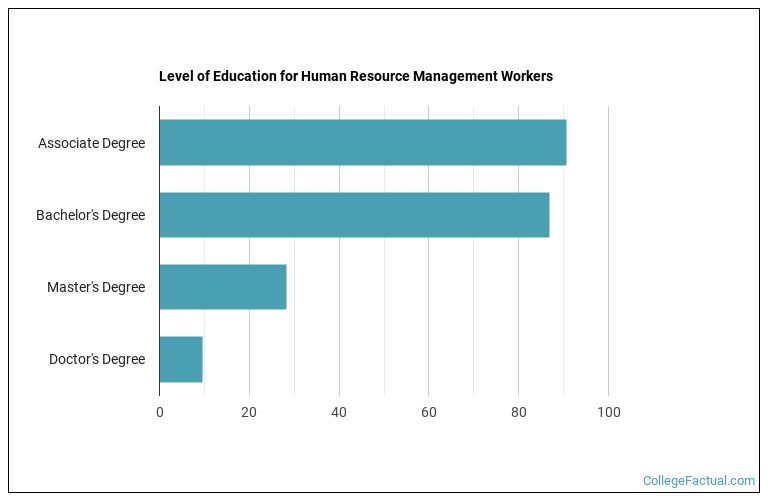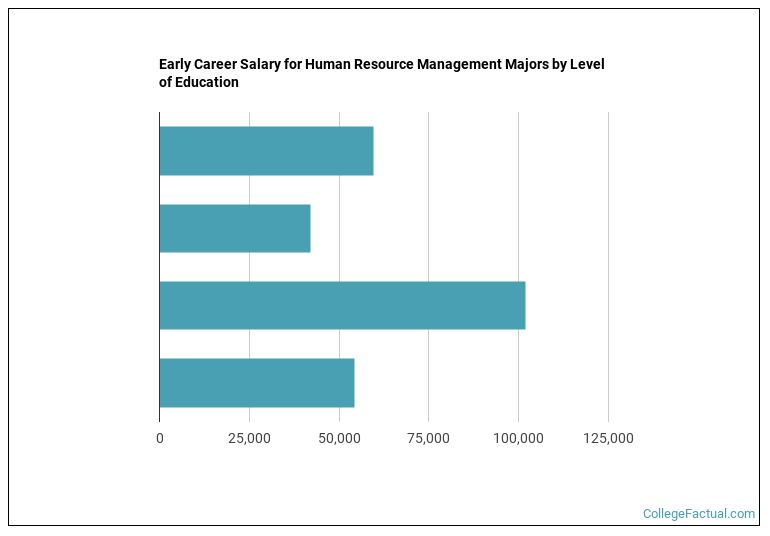 by our College Data Analytics Team
by our College Data Analytics TeamIt is impossible to have a successful business unless employees are properly trained, happy, and efficient. The work environment, hiring process, and work relationship are all important factors to a business's ability to thrive, making the role of Human Resource Manager critical to any business. These managers handle the staffing, training, pay, and policies of the workplace. By majoring in Human Resource Management, students will manage the progress of human capital in the workplace and provide services to these groups and individuals.
Some of the concentrations associated with this major are Labor and Industrial Relations, Organizational Behavior Studies, Labor Studies, and Human Resource Development.
There are a variety of courses you will take when majoring in Human Resource Management, they include employee and labor relations, organizational behavior, staffing, compensation and benefits, and statistics. This major is commonly offered as a Bachelor's Degree.
Human Resource Management was the 45th most popular major in the 2021-2022 school year. Colleges in the United States reported awarding 27,074 degrees in this year alone. Our 2025 Best Human Resource Management Schools ranking analyzes 281 of these schools to determine the best overall colleges for human resource management students. Continue reading to check out one of our many unbiased rankings of hr programs later in this article.
Those who work in the field of Human Resources need to be comfortable interacting with people. Your days will revolve around meeting the needs of others and making sure employees are satisfied. You will be working and meeting with others constantly, therefore strong communication skills are essential. You must be able to understand and listen to concerns and relay information to your superiors. Work on your interpersonal and communication skills while still in college in order to achieve success.
Students may benefit from an internship or work experience in any field where they interact with people. Customer service can be a great background to a job in Human Resources.
New students will need to have completed high school or a GED program and each school will have their own minimum GPA and SAT/ACT test requirements. Once you obtain your degree, additional hr certifications required to pursue a career in this field.
There are various different levels of hr degrees. Human Resource Management programs offered by schools range from a to a , which is the highest hr degree you can get. The type of hr degree you choose will determine how long it takes to get your diploma.
| Degree | Credit Requirements | Typical Program Length |
|---|---|---|
| Associate Degree | 60-70 credits | 2 years |
| Bachelor’s Degree | 120 credits | 4 years |
| Master’s Degree | 50-70 credits | 1-3 years |
| Doctorate | Program required coursework including thesis or dissertation | At least 4 years |
A bachelor's degree is the most common level of education achieved by those in careers related to hr, with approximately 52.1% of workers getting one. Find out other typical degree levels for hr workers below.
| Level of Education | Percentage of Workers |
|---|---|
| Bachelor’s Degree | 49.5% |
| Master’s Degree | 17.5% |
| Doctoral Degree | 12.0% |
| Post-Baccalaureate Certificate | 6.1% |
| High School Diploma | 5.5% |
Most workers in hr have at least a bachelor's degree. View the chart below to get an idea of what degree level most of those in human resource management careers have.

The education level required is different depending on the hr career you are seeking.
Graduates with a degree in Human Resources Management have the option to become Human Resources Mangers. These managers can work in virtually any type of industry and are in demand.
Graduates can also become a Human Resource Specialist. The specialist deal directly with the hiring processes of employees. They recruit, screen, and interview potential employees.
Want a job when you graduate with your hr degree? Human Resource Management careers are expected to grow 8.4% between 2016 and 2026.
The following options are some of the most in-demand careers related to human resource management.
| Occupation Name | Projected Jobs | Expected Growth |
|---|---|---|
| Human Resources Specialists | 586,700 | 7.1% |
| Training and Development Specialists | 315,300 | 11.5% |
| Human Resources Managers | 148,400 | 9.0% |
| Business Professors | 123,000 | 18.0% |
| Compensation, Benefits, and Job Analysis Specialists | 91,300 | 8.4% |
Human Resource Management graduates between <nil> reported earning an average of $56,790 in the <nil> timeframe. Earnings can range from as low as $26,439 to as high as $158,012. As you might expect, salaries for hr graduates vary depending on the level of education that was acquired.

Salaries for human resource management graduates can vary widely by the occupation you choose as well. The following table shows the top highest paying careers hr grads often go into.
| Occupation Name | Median Average Salary |
|---|---|
| Compensation and Benefits Managers | $132,860 |
| Human Resources Managers | $126,700 |
| Training and Development Managers | $121,730 |
| Business Professors | $103,330 |
| Labor Relations Specialists | $70,730 |
With over 1,565 different hr degree programs to choose from, finding the best fit for you can be a challenge. Fortunately you have come to the right place. We have analyzed all of these schools to come up with hundreds of unbiased hr school rankings to help you with this.
Human Resource Management is one of 21 different types of Business, Management & Marketing programs to choose from.
| Major | Annual Graduates |
|---|---|
| General Human Resources Management/Personnel Administration | 18,023 |
| Organizational Behavior Studies | 3,650 |
| Human Resources Development | 2,083 |
| Labor & Industrial Relations | 1,778 |
| Other Human Resources Management and Services | 1,254 |
| Related Major | Annual Graduates |
|---|---|
| Business Administration & Management | 403,753 |
| Accounting | 93,982 |
| General Business/Commerce | 56,779 |
| Finance & Financial Management | 54,690 |
| Marketing | 52,078 |
Image Credit: By Arunkumar Umapathy under License More about our data sources and methodologies.